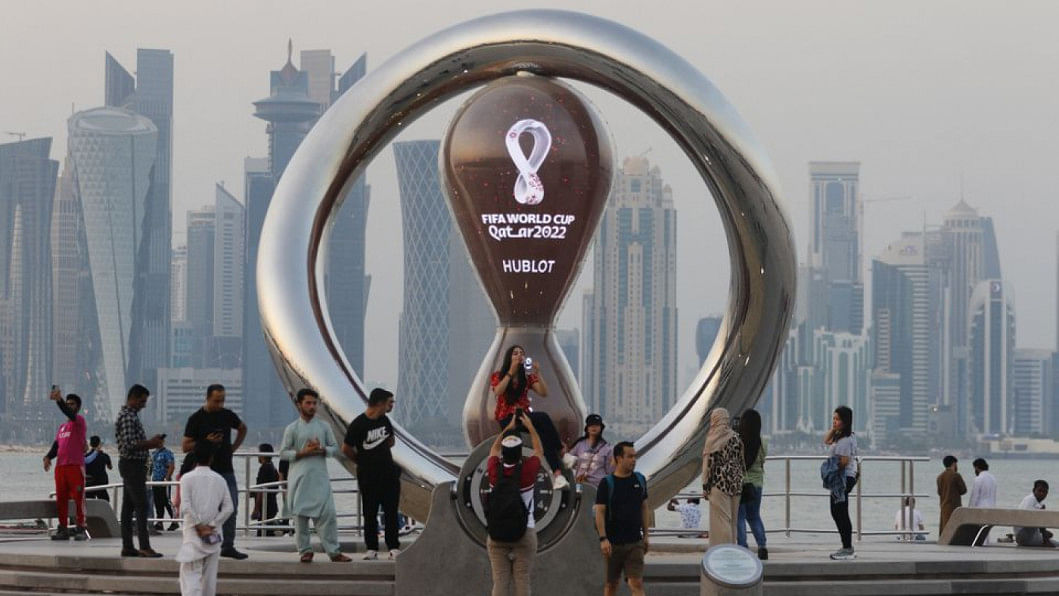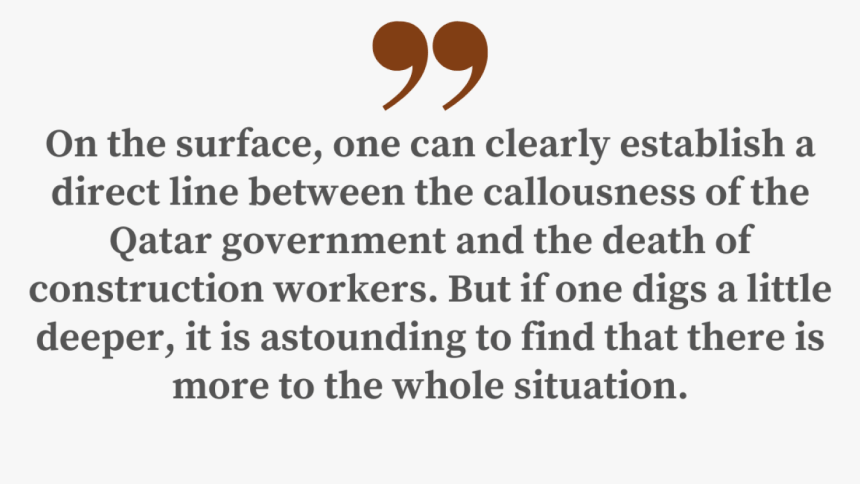Why I won’t boycott Qatar World Cup

More than 1,000 Bangladeshis died while working in Qatar between 2010 and 2020 as the Middle-Eastern country took up massive construction projects to host the 2022 FIFA World Cup, which is due to kick off on November 20. A few more thousands of South Asian workers – from India, Pakistan, Sri Lanka, and Nepal – also died during the same period, an investigation by The Guardian found. Most of these workers were poor immigrants who risked their lives and mortgaged their village homes to seek a better future. A lot of them died because of a lack of safety measures, poor working conditions, and complete callousness of construction companies. More people died in construction-related accidents in Qatar than in the Russia-Ukraine war, according to the UN.
Countries like Qatar and Saudi Arabia have an appalling history of labour rights, worker safety, and basic human rights. People who worked at construction sites in Qatar were not even allowed to visit local shopping malls in Doha. They were loaded in cage-like trucks and brought to the sites, where they worked all day, and then taken back to their residences in a faraway place from the city.
On the surface, one can clearly establish a direct line between the callousness of the Qatar government and the death of construction workers. But if one digs a little deeper, it is astounding to find that there is more to the whole situation. Many of these contractors are not necessarily Qatari companies; some of them are actually American and European companies with many German, French, Italian, and Japanese executives. Interestingly enough, they don't follow the same rules in Qatar as they would in Europe. In these companies, a large part of the labour acquisition and management is done by Bangladeshis, Indians, and Pakistanis.
According to the International Labour Organization (ILO), any international company regardless of where it operates should follow certain compliance guidelines to provide proper compensation, living conditions, and safety to its workers. However, these giant construction companies encompassing employees and bosses from Europe and the US often ignore ILO compliances. One study found that of the whole construction and labour process, only five percent work was done by Qatari nationals.
This does not excuse the Qatar government for its callousness. They should have had stronger enforcement of laws to provide worker safety. They should have had more laws to punish the contractors. They should be held accountable for labour conditions. But it's not so black and white. While we crucify Qatar, we should also realise that there is an intrinsic problem of corruption in the whole system, where Europeans, Americans, and even Bangladeshis are involved. What happens in the Middle East to the workers is a crime against humanity. It has gone on for far too long, and it needs to stop today. But an eye-washing boycott of the World Cup is not the way.
We are hearing that there is an uproar in Europe to boycott the 2022 FIFA World Cup. Many cities are even imposing restrictions on having public displays of games and celebrations. The hypocrisy of the European Union is quite well-known. European countries like France, Belgium, and Spain still reap economic benefits from impoverished African nations. They still provide weapons to various rebel groups, send armies to protect European corporations, extract natural minerals and collect tax from former colonies. When Europeans talk about labour rights, I would like them to visit the Belgian-controlled diamond mines in Sierra Leone.
Americans and Europeans do business worth billions of dollars with Saudi Arabia and the UAE. There is nothing wrong with that. In a globalised economy, countries should be doing business with each other. But what bothers me is the amazing power of their liberal storytelling. On the one hand, they are convincing their people that "we are doing the right thing by boycotting Qatar and showing our solidarity with the workers," while on the other hand, they are doing business as usual with proven violators of workers' rights. They could easily put sanctions on Saudi Arabia for violating human rights, and they could easily withdraw from the World Cup, saying no European nation would participate in the tournament that's tainted with workers' rights violation. But instead, average citizens think boycotting the World Cup would solve the labour problem.

Why just blame Europeans or Americans? We Bangladeshis have also collectively failed our immigrant brothers and sisters. There is a culture of turning a blind eye to the problems of the poor working class. When Mofizuddin of Moghadia steps on a plane, he has no idea that the game is skewed from the inside. The odds are all stacked against him. Nobody in the world, neither the Bangladeshi government nor the Europeans has an iota of sympathy for him.
The World Cup is a time of worldwide celebration. If someone wants to boycott it, it is their choice. But please don't make the rest of us feel guilty about it. We need not follow your misconstrued neoliberal agenda. Bangladesh is a cricket-hungry nation, but we all love football. More than 211 countries are enlisted in FIFA, and whether your country plays in the final round or not, everyone comes around every four years to celebrate the champions of the world. I remember being in Rome in 2006 when Italy won the World Cup, and I witnessed the endless celebration. We still ask each other, "Where were you when Brazil became the champion?" In Bangladesh, every four years we see the overwhelming festoons and flags of Brazil and Argentina. We wait every four years to express the pure joy of laughter and tears, for late-night parties and idiotic dances. The world comes together every four years to laugh and cry. We are one with the world.
The World Cup is a chance to celebrate humanity. Why should we boycott it?
Fawaz Rob is the CEO of Bangla Bari Ltd, an organisation to promote sustainable architecture in rural Bangladesh. He has taught architecture for 10 years.

 For all latest news, follow The Daily Star's Google News channel.
For all latest news, follow The Daily Star's Google News channel. 










Comments